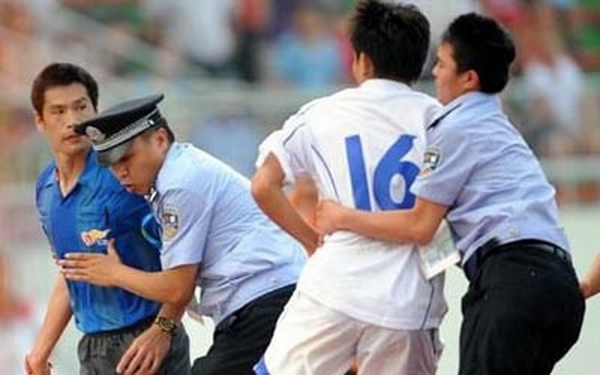By Will Bland
UPDATE: A day after confirming Nicholas Anelka's move, Shanghai Shenhua risked offending their touchy French star by letting it be known that the club is aiming for "an even better signing."
Nanjing-based daily Modern Express cited an unnamed senior official [English translation] at Shenhua who said that the club has its eye on another player, who has won both the Ballon D\'Or and World Player of the Year.
The only active players with both awards are Lionel Messi, Christiano Ronaldo, Kaka and Ronaldinho. 31-year-old Ronaldinho is contracted to Flamengo until 2014. How many millions would it to get him to swap three years in the Brazlian beaches and nightclubs for a spell in Shanghai smog?

Until last week, most European football fans had never heard of the Chinese Super League, and the rest of them only knew about the country's domestic football through a YouTube clip (GFW-friendly version here) of Tianjin players chasing the referee off the pitch.
The decision by Chelsea striker Nicolas Anelka to give up his place in the most widely-watched league in world sport for three seasons in Shanghai is a major step toward putting Chinese football on the map, and is covered in this week’s edition of the EO.
The circumstances of the Frenchman’s departure –he’s approaching the end of his career, had fallen out with his manager and Shanghai Shenhua were reportedly offering EUR7 million a year – suggest that scoring in Shaanxi and Shandong isn’t one of his longstanding ambitions.
However, the arrival of such a well-known and controversial player means that football fans in Britain and France now know at least one team in the Chinese league and might conceivably be curious to know how they perform.
Of course, Shenhua aren’t buying Anelka in order to win recognition from Europeans. Like Guangzhou Henda, who are paying Argentina’s Dario Conca around $10.4 million a year, Shanhua want to win Chinese fans.
As a Brit in China, one of the first things that struck me, after the enormity of Chinese cities, was the fact that, in the Shanghai subway on a Sunday evening, television screens were showing highlights from a Premier League football game in an English town with a population smaller than many of China’s so-called “villages”.
Why was a nation of 1.3 billion people more interested in a football league five thousand miles away?
The proudest moments of the Chinese national team – one World Cup qualification, victory in the 2005 East Asia Football Championship and the 19-0 thrashing of a team representing the pacific island of Guam - explain why Chinese might prefer their table tennis and badminton stars.
Even so, it surprises me that the country’s thousands of sports schools and academies found it harder to identify eleven talented footballers than their counterparts in war-torn Iraq, which beat China in qualification for the 2010 World Cup.
Perhaps Friend of China and football fan Henry Kissinger would know the answer.
“It can be no accident that […] no team from a communist country (except Hungary, in 1954) has ever reached the World Cup finals or semifinals. Too much stereotyped planning destroys the creativity indispensable for effective soccer,” he wrote in the Los Angeles Times on the World Cup Final in 1986.
Even if stereotyped planning does explain the mediocrity of the national team, it doesn’t necessarily explain the low-profile of the Chinese Super League.
A lot of Chinese football fans don’t seem interested in going to watch their teams play.
In Shanghai, a city with 23 million residents, the football stadium has a capacity of 33,000. Sunderland, an English city whose football club is near the bottom of the premier league, has a population of 177,000 and gets an average attendance of 40,000 for each home game.
Of the dozen people working in the Economic Observer’s internet department, two (male) journalists care about football and both support Beijing’s team, Guoan.
One of them, Liu Zhao, spends much of his time playing Football Manager, the computer game that simulates life in charge of a football club. He has only ever seen one game at the Workers Stadium, where Guoan play. When asked why, he answered, “it’s too noisy, they chant ‘stupid c**t’ nonstop .”
